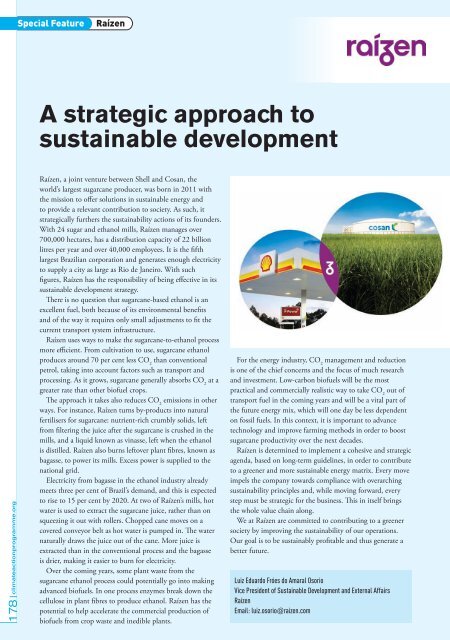Climate Action 2011-2012
Create successful ePaper yourself
Turn your PDF publications into a flip-book with our unique Google optimized e-Paper software.
Special Feature<br />
Raízen<br />
A strategic approach to<br />
sustainable development<br />
178 climateactionprogramme.org<br />
Raízen, a joint venture between Shell and Cosan, the<br />
world’s largest sugarcane producer, was born in <strong>2011</strong> with<br />
the mission to offer solutions in sustainable energy and<br />
to provide a relevant contribution to society. As such, it<br />
strategically furthers the sustainability actions of its founders.<br />
With 24 sugar and ethanol mills, Raízen manages over<br />
700,000 hectares, has a distribution capacity of 22 billion<br />
litres per year and over 40,000 employees. It is the fifth<br />
largest Brazilian corporation and generates enough electricity<br />
to supply a city as large as Rio de Janeiro. With such<br />
figures, Raízen has the responsibility of being effective in its<br />
sustainable development strategy.<br />
There is no question that sugarcane-based ethanol is an<br />
excellent fuel, both because of its environmental benefits<br />
and of the way it requires only small adjustments to fit the<br />
current transport system infrastructure.<br />
Raízen uses ways to make the sugarcane-to-ethanol process<br />
more efficient. From cultivation to use, sugarcane ethanol<br />
produces around 70 per cent less CO 2<br />
than conventional<br />
petrol, taking into account factors such as transport and<br />
processing. As it grows, sugarcane generally absorbs CO 2<br />
at a<br />
greater rate than other biofuel crops.<br />
The approach it takes also reduces CO 2<br />
emissions in other<br />
ways. For instance, Raízen turns by-products into natural<br />
fertilisers for sugarcane: nutrient-rich crumbly solids, left<br />
from filtering the juice after the sugarcane is crushed in the<br />
mills, and a liquid known as vinasse, left when the ethanol<br />
is distilled. Raízen also burns leftover plant fibres, known as<br />
bagasse, to power its mills. Excess power is supplied to the<br />
national grid.<br />
Electricity from bagasse in the ethanol industry already<br />
meets three per cent of Brazil’s demand, and this is expected<br />
to rise to 15 per cent by 2020. At two of Raízen’s mills, hot<br />
water is used to extract the sugarcane juice, rather than on<br />
squeezing it out with rollers. Chopped cane moves on a<br />
covered conveyor belt as hot water is pumped in. The water<br />
naturally draws the juice out of the cane. More juice is<br />
extracted than in the conventional process and the bagasse<br />
is drier, making it easier to burn for electricity.<br />
Over the coming years, some plant waste from the<br />
sugarcane ethanol process could potentially go into making<br />
advanced biofuels. In one process enzymes break down the<br />
cellulose in plant fibres to produce ethanol. Raízen has the<br />
potential to help accelerate the commercial production of<br />
biofuels from crop waste and inedible plants.<br />
For the energy industry, CO 2<br />
management and reduction<br />
is one of the chief concerns and the focus of much research<br />
and investment. Low-carbon biofuels will be the most<br />
practical and commercially realistic way to take CO 2<br />
out of<br />
transport fuel in the coming years and will be a vital part of<br />
the future energy mix, which will one day be less dependent<br />
on fossil fuels. In this context, it is important to advance<br />
technology and improve farming methods in order to boost<br />
sugarcane productivity over the next decades.<br />
Raízen is determined to implement a cohesive and strategic<br />
agenda, based on long-term guidelines, in order to contribute<br />
to a greener and more sustainable energy matrix. Every move<br />
impels the company towards compliance with overarching<br />
sustainability principles and, while moving forward, every<br />
step must be strategic for the business. This in itself brings<br />
the whole value chain along.<br />
We at Raízen are committed to contributing to a greener<br />
society by improving the sustainability of our operations.<br />
Our goal is to be sustainably profitable and thus generate a<br />
better future.<br />
Luiz Eduardo Fróes do Amaral Osorio<br />
Vice President of Sustainable Development and External Affairs<br />
Raízen<br />
Email: luiz.osorio@raizen.com












